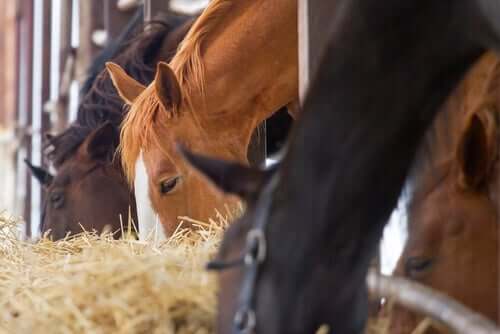Basic Horse Supplements


Written and verified by the lawyer Francisco María García
The right feed needs to provide all the nutrients that an animal needs. However, depending on the situation and what activities your horse is involved in, they may need something extra. In this article, we’ll talk about the basic horse supplements that are available.
What to feed your horse
This will largely depend on what the horse is used for, particularly if they are used for competitions or hard labor. In these cases, their diet should be reviewed in case there are some extra nutrients that you need to incorporate in their daily diet.
Recommended daily amounts
First of all, as well as making sure that your horse is getting enough food, you need to make sure that they’re eating the right food.
- Light work: 70% hay and 30% feed
- Moderate activity: 60% hay and 40% feed
- Heavy activity or competitions: 50% hay and 50% feed

In the latter case, it’s essential to add some basic supplements because of the intensity of the activity.
What are supplements
During sporting activity or hard labor, horses need additions to their normal diet. Supplements are vitamin complexes that increase the levels of nutrients in their food.
This way, you can make sure that your horse gets the right amount of vitamins.
Formats
Horse supplements on the market are available in various different formats, including syringes, granules, liquids or powers. Theses range from the simple vitamin supplements, which provide a single vitamin such as vitamins C or E, to more complex multi-vitamin supplements.
Additionally, there are some supplements available that are made with natural products. Examples include mixtures based on nettle, linen, and calendula.
Basic horse supplements: where to start
Vitamins A, D, and K
Vitamin A is mainly acquired through their normal diet, as long as their hay is of good quality and they’re given big enough portions.
Good quality hay will have a slightly green color and a fresh, natural smell.
Vitamins C and B
These should be replenished daily and usually dissolved in water.
Other vitamins
The following are also important, depending on your horse’s needs and energy expenditure:
- Boiled flaxseed provides proteins. This should be added to their normal food in small quantities.
- Linseed oil improves the horse’s digestion and coat.
- Cod liver oil provides vitamin D. This is recommended in winter for animals that live in stables.
- Natural supplements, such as carrots and apples, which are sources of vitamins and minerals which horses generally like.
Short-term effects
If your horse has a good diet, but they need something extra to perform at their best, it’s a good idea to use high-performance supplements.
These can found in liquid form based on:
- Creatine
- Vitamin B1, B2, and B6
- Folic acid
- Biotin
- Superna
- L-Carnitine
What are nutraceuticals?
The vitamins that we’ve mentioned above are the basic ones found in a diet. However, nutraceuticals are supplements that mix herbs with pharmaceutical ingredients, which are not drugs.
They help to increase the body’s defenses and its ability to heal itself. However, these effects are gradual and will be more noticeable in the long term.
Beware of excess
In the case of vitamins and supplements for horses, it’s important to keep an eye on the quantities that they’re given.
When giving a horse several supplements or mixtures of them, it’s important to take care of portion sizes, since too much of something could be harmful.
Excess vitamin A can cause kidney problems and the associated symptoms are:
- Night blindness
- Infections
- Watering eyes
- Reduced fertility

Excess vitamin D will be shown by:
- Lack of appetite and weight loss
- Excessive drinking and urinating
- Calcified kidneys
How to feed your horse supplements
- Bear in mind that not all vitamins are created equal, and pay attention to the body’s ability to absorb them.
- It’s also important to consider which mixtures enhance (vitamin E with selenium) or suppress (Vitamins C and E with iron and copper) the effects of the supplement.
- Make sure that your horse gets hay, cereals and horse feed.
- Review your horse’s physical condition and the level of work that they’re involved in to ensure that their diet is adequate.
- Don’t go over the recommended amounts of nutrients if you mix multiple supplements together.
Lastly, keep yourself informed and stay wary of any miracle products promising instant results. In fact, it’s a good idea to take a visit to your vet to help you adapt portions to your horse.
Main Image Source: Contando Estrellas
This text is provided for informational purposes only and does not replace consultation with a professional. If in doubt, consult your specialist.